Racism
Editor's Note: This column is part of a duo of posts commenting on racial reconciliation in light of Martin Luther King, Jr. Day. Read the accompanying piece, "A Convenient Truth: I Am White."
I am black in the United States of America. It is quite inconvenient to be black in the United States of America. It has always been inconvenient to be black in the United States of America.
My African ancestors were brought to the United States in chains against their will, taken straight to the plantations, and forced into slavery. They did not pass through Ellis Island, as did most of the ancestors of my white counterparts. My ancestors who fought in two world wars were not allowed any advantages of the GI Bill, schooling, the trade unions, or the opportunities of corporate America that white veterans had; therefore, as a black baby I am more likely to be born into a family who is mired in systemic poverty than a baby who is white.
I am much more likely to live in an impoverished neighborhood, receive an inferior education in a neighborhood school, and not graduate from high school than white students my age. Those are inconvenient truths.

Editor's Note: This column is part of a duo of posts commenting on racial reconciliation in light of Martin Luther King, Jr. Day. Read the accompanying piece, "An Inconvenient Truth: I Am Black."
I am white. It is quite convenient to be white. In fact, it has always been convenient to be white in the United States of America.
According to the U.S. Census Bureau, I am more likely to be employed than someone who is not white, I am less likely to be incarcerated, I am more likely to be covered by health insurance, and I am more likely to enjoy a comfortable retirement and eventually die peacefully in my elder years. I am more likely have a college education than a non-white person, my (white) wife is more likely to receive excellent medical care, my (white) children are more likely to attend private schools with skilled teachers, and my (white) family is more likely to have a roof over our heads, a few cars in the garage, and more than enough food on our table.
While individual cases vary, to be white is – generally speaking – a convenient truth.
There are countless factors one could cite for the current levels of race-based inequality in the U.S., and many opinions exist surrounding potential solutions, yet there are three points of emphasis that need to be addressed for the advancement of racial reconciliation.
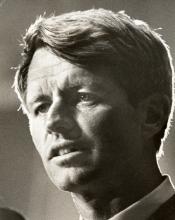
When I stepped back and really thought about what I was experiencing on election night, I started thinking about the night of April 4, 1968, just hours after Martin Luther King, Jr. was assassinated. Having not yet been born, I thought about the coverage of it that I’ve seen. About how Robert Kennedy found himself in front of a crowd of supporters for a presidential campaign rally in Indianapolis. Many there that night were black and hadn’t heard the news of King’s death. As he did with most difficult topics, Kennedy laid it all out there. The crowd gasped and screamed and cried. Kennedy said he understood the anger and hate each of the men and women there that night would probably feel. After all, a white man had also killed his brother.
“What we need in the United States is not division,” Kennedy told the crowd. “What we need in the United States is not hatred. What we need in the United States is not violence and lawlessness, but is love and wisdom and compassion toward one another. A feeling of justice toward those who still suffer within our country.”
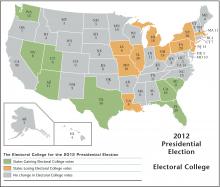
The United States is the only democratic country in the world where a candidate can be elected as president without earning the highest number of votes.
In the midst of competing campaigns and critical choices leading up to Election Day, one of the most common assumptions is that U.S. citizens directly select their president. However, far too many fail to fully understand that such direct selection is not our reality, for within our complex electoral system – known as the Electoral College – the will of the people does not always translate into final results. During the presidential elections of 1876, 1888, and 2000, the leader in popular votes did not claim victory, and some believe a similar scenario may take place in the near future. And so, when a candidate receives the majority of votes but is not sworn into office, we recognize a gross injustice that requires immediate and significant transformation.
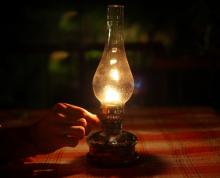
“Long Time Gone” is David Crosby’s anthem of hope in jeopardy. He wrote it the night Robert F. Kennedy was assassinated.
“I believed in him because he said he wanted to make some positive changes in America, and he hadn’t been bought and sold like Johnson and Nixon – cats who made their deals years ago with the special interests in this country in order to gain power,” Crosby wrote in the liner notes of the 1991 CSN boxed set. “I thought Bobby, like his brother, was a leader who had not made those deals. I was already angry about Jack Kennedy getting killed and it boiled over into this song when they got his brother, too.”
In the ‘60s, the Kennedys represented hope for change: racial equality, economic justice, and abolishing the death penalty, for example. Five decades later, you still don’t see many long-haired politicians, but that hardly seems the matter of dire culture import that it apparently was in 1968. And now we have a black president. Still, on the whole, Crosby’s words seem prescient, rather than anachronistic.
Almost 50 years later, we’re still giving legal benefits to some couples but denying them to others, not to mention that we fill our prisons with brown-skinned people, too many women are still ashamed to report rape or domestic violence, greedy people hoard resources while others go hungry, and the president who campaigned on hope hasn’t been able to bring any real change in our unjust economy.
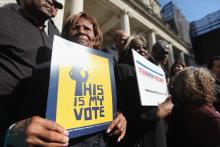
The 15th Amendment to the United States Constitution was the third in a triad of amendments crafted to protect the rights of recently emancipated African Americans. The 13th Amendment abolished slavery. The 14th Amendment granted citizenship to people who were once enslaved, regardless of race. The 15th Amendment, which was passed by Congress February 26, 1869 and ratified February 3, 1870, reads:
Section 1.
The right of citizens of the United States to vote shall not be denied or abridged by the United States or by any State on account of race, color, or previous condition of servitude —
Section 2.
The Congress shall have the power to enforce this article by appropriate legislation.
It took nearly a century of blood, terror, and tears, but in 1965 President Lyndon B Johnson and the 89th U.S. Congress passed the Voting Rights Act of 1965; legislation to enforce the 15th Amendment. Finally.
One year more than a decade later, in 1976, I walked hand-in-hand with my mother trudging up and down city blocks lined with row houses in our West Oak Lane neighborhood of Philadelphia. Each time we knocked and a neighbor came to the door, my mom, who served as the judge of elections for our neighborhood, asked: “Are you registered to vote?” If they weren’t, out came the clipboard.
I didn’t understand the legacy we were a part of that day, but with each sweep of the clipboard we were brandishing a non-violent weapon in the long fight of our ancestors to be and stay free. For 100 years — that’s five generations — they faced down the terror of burning crosses, threats to life and livelihood, and the elaborate labyrinth of Jim Crow voting laws — all set up to suppress their votes, all set up to crush their ability to exercise dominion.
So, when the Supreme Court announced recently that one of the cases it would take up in this session was a challenge to Section 5 of the Voting Rights Act, the hairs rose on the back of my neck.
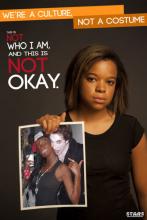
Americans love Halloween. In fact, maybe it’s fair to say we go crazy about Halloween. How crazy?
Americans spend $310 million dollars per year on costumes … for our pets. Wow.
In total, Americans spend between $6.5 – $6.86 billion dollars on all things Halloween: costumes, candy, and decoration. More wowzers.
So, as the average consumers spends about $27 on costumes, I thought it’s never too early to encourage folks to be careful how they dress up for Halloween … even if it’s “all in the spirit of fun.”
Listen, I like fun. And while my social life is nearly zilch, I like fun parties, but it’s all fun and games until someone shows up at a costume party or … err … at your front door trick-or-treating in a borderline racist costume.
Yes, it’s not too early to tell people:
Please don’t dress up in a blackface, yellowface, brownface, or any other costumers that stereotype, denigrate, or mock another culture.
Don’t caricature another real culture. Why? Because we’re a culture and not a costume.

I started my Tennessee sabbatical with a story about three peace activists who recently shut down the Y12 bomb plant here in Oak Ridge with a stunning protest, armed only with a bible and flowers.
I figure I’ll end my sabbatical with another great story of East Tennessee mischief.
This is the story of one of my favorite flash-mob actions, which happened right here in Knoxville. And this year marks its five-year anniversary.
It all happened on May 26, 2007.
Word had begun to spread that a group of white supremacists — including members of the KKK — were converging here in Knoxville, Tenn., for a rally in a park downtown. It was on the news and in the papers.
Many locals were pretty upset by the public display of racism and hatred. Even though many of the folks connected to the hate-group were coming from other states, they had obtained a permit to gather and publicly proclaim their hate-filled message of White Power.
But they had no idea what was coming.
A group of locals had decided neither to cower away in fear nor to fight fire with fire....Instead they decided to meet hatred with humor.
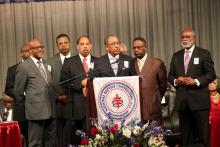
African-American clergy are joining forces with civil rights groups to push for increased voter registration ahead of the November election, spurred on by new voter laws they say restrict opportunities for minorities to enter the voting booth.
"We must vote because we must counteract the corrupt and diabolical strategies of those who are trying to take away our vote by passing laws to suppress and diminish our voting rights," said the Rev. Julius Scruggs, president of the National Baptist Convention, USA, at a news conference Wednesday (Sept. 5) during his denomination's Annual Session in Atlanta.
Scruggs, leaders of the National Association for the Advancement of Colored People and top officials of four other black Baptist groups gathered to rally against the new laws and continue longtime efforts to get blacks registered to vote.
More than two dozen new voter laws have passed in 19 states since 2011, according to the Brennan Center for Justice at New York University School of Law. Some have been overturned but others remain on the books, such as a voter ID law in New Hampshire and proof of citizenship requirements in Alabama, Kansas and Tennessee. Proponents say they prevent fraud, while opponents say they are reducing access to the polling booth.
The voting laws — through which some states have reduced early voting or required government-issued identification to enter the polls— have changed some of the clergy's voter education initiatives.
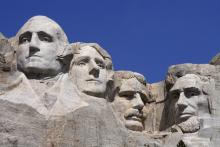
The Wild Goose Festival was awesome as expected this weekend in Corvalis, Ore. About 1,000 folks gathered for the first-ever west coast version of the event started in North Carolina. There were artists, theologians, pastors, hippies, activists, poets, and any number of other curious observers, navigating the landscape to better understand where this movement might be headed.
I offered a workshop on Saturday with Brian Ammons and Bruce Reyes Chow on masculinity and male identity. Folks gathered in the small animal arena on the fairgrounds where the event was held to hear about, and respond to, male identity from three fairly distinct perspectives. It was a rich conversation and pretty fun, at least until one question came toward the end, from a guy in the back row.
I suppose we should have seen it coming, but we had gotten a little too comfortable. The following is a paraphrase of what he said, but the essence is the same.

My sons, ages 13 and 10, spend two evenings each week on a golf course because I parent out of my own personal brokenness, which includes an acute awareness of life experiences and skills I was not exposed to growing up.
Tennis lessons. Skiing lessons. Swimming lessons. Golf lessons.
Check. Check. Check. Check.
(My daughter got the first three. She escaped golf because she has immersed herself into the world of dance for the past few years though it’s not completely out of the picture yet.)
One of my goals has been to expose my children to things I didn’t do and at one point or another felt like I had missed out on. This all despite the fact that I also wrestle with my own personal prejudices against sports like tennis and golf because they have in one way or another represented privilege and access to opportunities and networks my parents and I did not have.
So it did not surprise me to see a very diverse group of participants on our first day at the course – diverse meaning White or Caucasian children were in the minority. Golf, whether you are in business or in medicine, more if you are male but increasingly so if you are female, is one of those “life skills” that also translates into opportunities and networks that non-White communities continue to learn about and enter into.

Today, two Christian leaders in Arizona delivered a petition signed by thousands of Christians to Gov. Jan Brewer calling on her to retract her controversial executive order denying driver’s licenses and other benefits to undocumented young people who qualify for deferred action. The petition was signed by members of the Sojourners community and reads:
We believe every person, regardless of immigration status, is created in God's image. Your recent executive order denying driver's licenses and other benefits to undocumented young people who qualify for deferred action is harsh and short-sighted. As people of faith, we urge you to reconsider your position and retract this executive order so that all God's children in Arizona can contribute to your state's economy and strengthen its communities.
Pastor Yvette Lopez of the New Life Church of God in Tucson, Ariz., also helped deliver the petition.
“I’m a conservative, but this is this was the last straw for me,” Lopez said.“This executive order is deplorable, and it must be rescinded; my faith and my politics demand this.”

Every morning at 7:15, the doors of our school open wide to a line of bus riders ready to come inside. "Hello, Jaheem. Hi, Kiara. Hey, Imani. Hope you're having a good day, Omar," I call out as the students walk past me to the cafeteria for breakfast. I stand at the doors for a moment and watch the big, yellow buses puff their diesel exhaust and chug their way to the garage until it's time for their afternoon run.
Is there a more universal symbol for public schools than a big, yellow school bus?
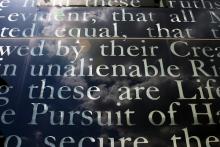
"We hold these truths to be self-evident, that all men are created equal, that they are endowed by their Creator with certain unalienable Rights, that among these are Life, Liberty, and the pursuit of Happiness (The Declaration of Independence, 1776)."
These words are some of the most familiar and beloved in the English language, as they offer a moral vision for humanity, and a standard to which the United States of America should strive.
While such expressions of freedom should indeed be cherished, we often forget the harsh reality that many contributors of the Declaration of Independence were also active participants in the brutal act of slavery. As the English abolitionist Thomas Day wrote in 1776: “If there be an object truly ridiculous in nature, it is an American patriot, signing resolutions of independency with the one hand, and with the other brandishing a whip over his affrighted slaves.”
In addition to racial inequality, while Abigail Adams reminded her husband John to “remember the ladies” during the Constitutional Convention of 1787, her warnings were mostly disregarded, and as a result, women were also marginalized, and they were relegated as dependents of men, without the power to own property, make contracts, or vote. In other words, John Adams’ reply to Abigail’s challenge was far from considerate: “As to your extraordinary code of laws, I cannot but laugh …”
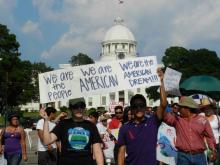
We lost a bitter legislative battle this year, as Alabama Legislators voted to make the nation's most toxic anti-immigrant law more poisonous than anyone imagined. Added to the notorious HB 56 is a requirement that the names and faces of undocumented persons be plastered on the web and in prominent public places — the new law stops just short of putting targets on their backs.
Teachers are still required to interrogate schoolchildren about their immigration status. People of faith, Good Samaritans, and family members are now felons if they knowingly drive five undocumented children to the store, the doctor, or Vacation Bible School. Racial profiling provisions make every trip to school, work, and church a nightmare.
The legislators — all Republicans — must have laughed all the way to golf games waiting for them back in their districts. They think they won.
E-mails from former Sen. Russell Pearce purportedly reveal the motivations behind SB 1070, claims the ACLU:
"The American Civil Liberties Union of Arizona has released thousands of e-mails that it says proves Arizona's controversial immigration law was racially motivated.
The e-mails, acquired through a public records request to the state Legislature, are to and from former senator Russell Pearce, who authored Senate Bill 1070."
Read the full story HERE.
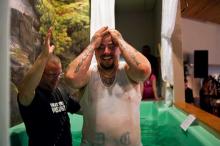
Two years ago, Chris Simpson led a white pride march.
Six months ago, he abandoned the white supremacy movement.
On April 15, he was baptized.
Five days later, Simpson sat in the waiting room of a skin and vein clinic, waiting to start the long and painful process of having his tattoos, most replete with Nazi or white pride iconography, removed.
"Hate will blind you to so many things. It will stop you from having so many things," Simpson said. "It consumes you."

Even at 10 p.m., the dry heat caused the collapse of multiple people of faith gathered in a candlelight vigil outside Sheriff Joe Arpaio’s infamous tent city jail on Saturday evening. Earlier in the day, nearly 120 miles due south of Phoenix, the bodies of three immigrants who died of heat stroke were found. In one of those cases of tragic death, the man who collapsed was Guatemalan and his pregnant wife sat by his side.
Arizona continues to lead the way in the border humanitarian crisis and with immigrant rights violations. As a humanitarian, ally, and advocate, I came to the migrant justice movement with the belief that the U.S. immigration system and border policies were merely broken, but I am convinced now that these violations of human dignity are the symptoms of systemic racism targeted at immigrants.
The system is not broken, it is meant to break people.
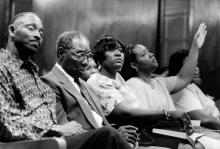
In June of 1998, three presumed white supremacists from Jasper, Texas severely beat and then murdered James Byrd, Jr. by tying him to a pick-up truck and dragging his body for miles. This incident has made the town infamous and, unfortunately, the racial divide continues to linger. According to a report in The New York Times, the city’s first African-American police chief has been fired by a predominantly white city council, prompting the former chief to take legal action and the NAACP to seek a federal investigation.
Even more shocking are the sentiments expressed by some of the town’s leaders.

"Very truly, I tell you, unless a grain of wheat falls into the earth and dies, it remains just a single grain; but if it dies, it bears much fruit."
~ John 12:24
When tragedies loom so large, it is difficult to keep a perspective on the small things, to view things on a human scale.
We are trained to see the harvest and ignore the seed. We look at end results for the quick post and tweet. The planting, the watering, the tending is too tedious. Show me the aisles of glowing produce under the florescent lights and keep the dirt and the sweat away. Show me the abundance and not the labor.
And yet, every fruit and vegetable and grain begins as a seed. It begins in the smallest of things.
Soon, the story of Darius Simmons will become larger than life. A story that has picked up some media attention will no doubt soar – for a moment – as the Rev. Jesse Jackson and Rainbow PUSH continue to walk with his family and call for justice. This is their work and their calling and I bless them for it. I am thankful for it.
Darius’ story is a sensational one – full of racial tension and violence. It is a refrain sung over and over in our nation, the dissonant chorus that reminds us of our nation’s original sin.